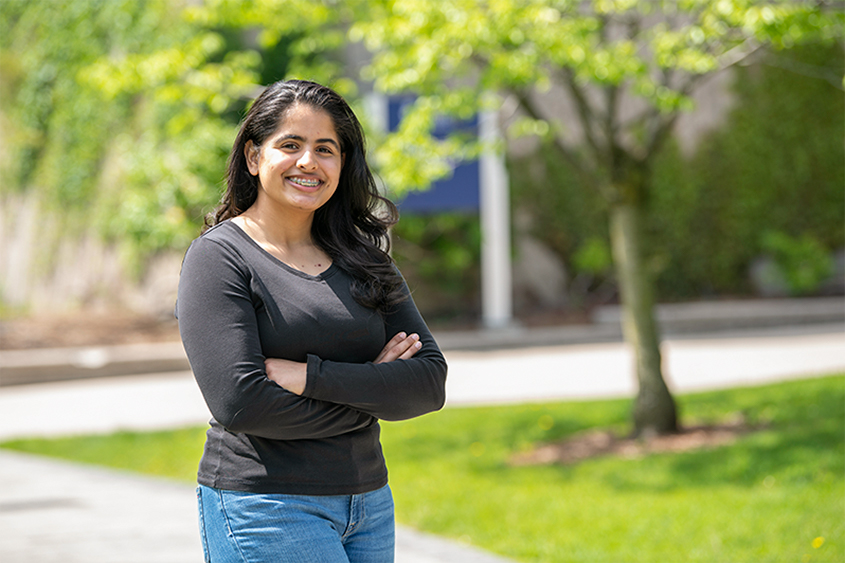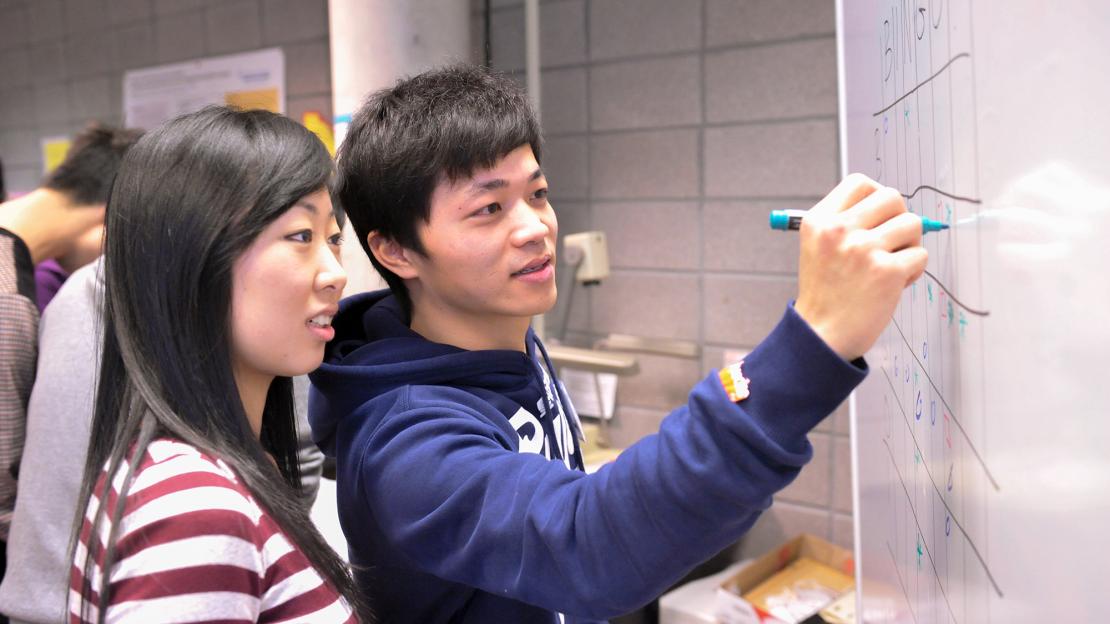The university learning environment is unique — and so is your first year navigating it.
It’s an important time that comes with its own challenges and opportunities. So, we asked standout and award-winning graduates for the top pieces of advice they would give their first-year selves.
Tune in to how you learn and participate early
Nivetha Chandran, former president of the Biology Students’ Association (BioSA), recommends using your first year to figure out how you learn best.
If your courses have web options, she advises discovering whether an in-class experience helps you absorb more information before relying solely on video lessons.
Many third- and fourth-year courses tend to use more discussion-based learning. Chandran says practicing by engaging in classes early on can help develop the confidence and familiarity that will help you participate later in your academic career.
“I know it can be very intimidating in a big class, but realize that a lot of people in the class probably have the same question as you,” she says. “Your professor knows that you’re an undergraduate student and that everyone makes mistakes and everyone is at different levels.”
She recommends using your first year to become familiar with campus resources that work for you. For example, try the Academic Advising and Career Centre’s study skills workshops — “They are a useful way to learn about time management and effective study skills.”

Use office hours
Chandran says office hours were a key part of developing a deeper relationship with her professors and building her confidence to participate in class.
She encourages first-year students to ask questions about concepts from lectures and readings, or even talk to instructors about how course content relates to current events.
“Everyone walks in with different expertise and certain professors have worked globally, so they can give you a global perspective verses a Toronto perspective,” she says.
Professors can also give you insights into how they recommend studying for different courses. Chandran says these, along with other campus resources, are a great way to find study methods that work for you.
Tamera Campbell, who played an instrumental role in developing U of T Scarborough’s Student Refugee Program, recalls being surprised when a professor told her office hours were underused, “because she is super approachable and awesome.”
She says the time can be a chance to get to know an interesting person, and adds that building these relationships may lead to opportunities later.
“When you get to know your professors, there’s the added plus of gaining access to mentorship, research jobs and references.”
Use your passion to pick your program
Campbell recommends using your first year to discover which courses genuinely interest and come naturally to you, then harnessing that experience when choosing your major.
“Please do not choose a program solely because your parents want you to or because it’s lucrative,” she advises. While parental advice and career opportunities are important to consider, Campbell says you should also think about your own skills and interests, to pick “the program that best suits you.”
Campbell, who graduated with a BA in public policy co-op and sociology, also recommends finding if there is a co-op option for your program.
Co-op programs give students on-the-job experience with full-time, salaried work terms in places related to your field of study. U of T Scarborough is the only U of T campus that offers formal co-op programs across the arts, sciences and management.
“You’ll gain months of experience in your field of interest that will give you an edge when you’re applying for jobs,” she says.
To discover your passion, take note of what is or isn’t making you curious, says Rasanmeet Sahota, who was president of UTSC’s branch of HOSA (Health Occupation Students of America) in her fourth year.
“Curiosity is so important because I find if I’m not curious about something anymore, then that means I’m either not working hard or I’m losing my passion,” says Sahota, a double major in biochemistry and political science.
If you feel something sparking that curiosity, she advises taking a few elective courses in that subject during your first or second year. These courses will likely still count toward your degree requirements and may help you pick a major or minor.
When you feel compelled to learn more about a subject and go beyond what’s expected, it may indicate you have a budding passion, she adds.

Use extra-curricular opportunities for skill development
“I know people say, ‘Join clubs, you will meet people,’” Sahota says. “But also join clubs to foster your skills.”
Her family jokes that after her work as president of HOSA UTSC, she now has enough experience in managing teams and finances to run a small business.
“Even though it’s a joke it truly made me realize, ‘Oh, I can do these things,’” she says. “Even as a science major, I learned skills in management, delegating, planning and a lot of other areas that could apply to different things.”
Chandran recommends looking both on and off campus for events, clubs or organizations related to your field. These may come as co-op options, or work-study positions, which are part-time jobs created for current students by the university. Students can also serve as research assistants under staff from any of the three campuses.
Chandran says her work-study position as a research assistant at the Centre for Addiction and Mental Health (CAMH), “opened up so many opportunities to work in research and helped me develop so many skills.”
Check out these academic resources on campus that may help you in your first year:
Academic, career and study skills supports
Writing, math, academic English supports and more
Explore program options and use tools to find which program is best for you
